WASHINGTON, D.C. -- America's youngest voters are mindful of history and the impact on their own lives as they prepare to cast ballots on Nov. 4. Among 18- to 29-year-old registered voters surveyed for a USA Today/MTV/Gallup poll, 61% support the Obama-Biden ticket, versus 32% who prefer the McCain-Palin ticket, with Obama's voters being far more likely to be certain about their vote than McCain's.
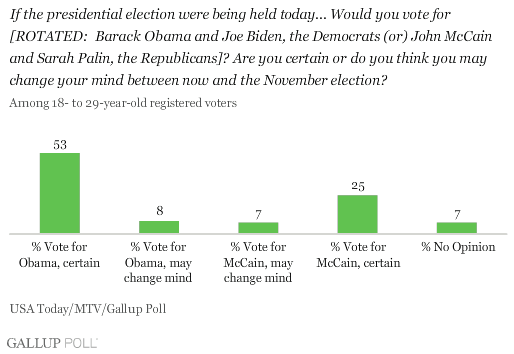
Obama's strong appeal to younger voters is apparent in that he outperforms McCain by double digits on every single character dimension tested in the poll of more than 900 18-29 year olds nationwide, conducted by Gallup for USA Today and MTV Sept. 18-28, 2008. The 47-year-old Obama swamps 72-year-old McCain, 71% to 12%, on understanding the "problems of people your age" and even wins on what is a McCain strength among the broader electorate, being a "strong and decisive leader," 46% to 36%.
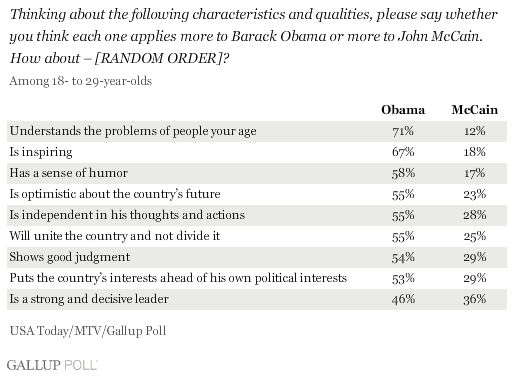
While only a minority (37%) of young adults have qualms about McCain's age, a majority (55%) do have concerns about his running mate Sarah Palin's qualifications to step in as president if necessary. In contrast, a majority are satisfied with both Obama's experience and running mate Joe Biden's qualifications. (The poll was conducted before the Oct. 2 vice presidential debate.)
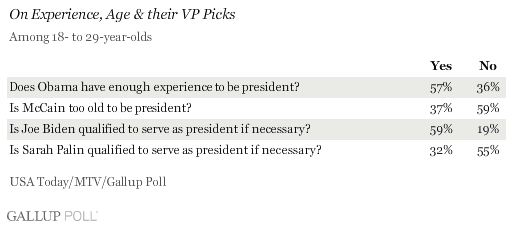
Obama also beats McCain on several lighter dimensions tested in the poll. A majority of 18- to 29-year-olds would choose Obama over McCain as a teacher, boss, drinking buddy, or advisor. McCain's only appeal on this level with young adults appears to be his personal life story as young adults are more likely to be interested in reading McCain's private diary than Obama's. While such items may seem trivial, basic likeability can be a key indicator of a presidential candidate's ability to win votes.
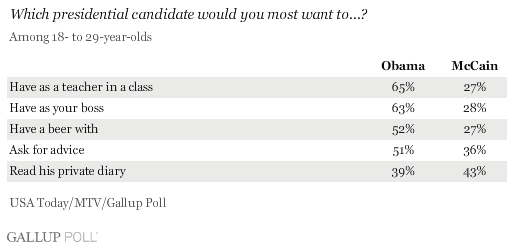
When asked in an open-ended fashion to name the single most important issue affecting their vote for president this year, 18- to 29-year-old registered voters most often cite the economy (30%), followed by the war in Iraq (13%), healthcare (5%), energy and gas prices (4%), and international issues (4%). These issues are, in a broad sense, little different from those listed by all voters, regardless of age. Asked which candidate they think would do a better job on their top-priority issue, 58% say Obama versus 27% who say McCain, again echoing their basic candidate choice.
On the Outcome
The poll results make it clear that young Americans perceive that the outcome of the election really does matter, both to the country and to their own lives. Nearly-two thirds (64%) of 18- to 29-year-olds surveyed say they have already given the election a lot of thought. Nearly half (44%) consider this election to be the most important of the last 50 years, and another 37% consider it more important than other elections.
When asked about the consequences of the two possible election outcomes, 84% say an Obama victory would have a great deal (47%) or moderate amount (37%) of impact on their lives and 72% say the same about McCain (36% great deal, 36% moderate amount).
Going a step further, the survey asked those who said an Obama or McCain victory would impact them "a great deal" or "not at all" to explain in their own words why they feel that way. In Obama's case, nearly one in four (24%) volunteered that good or positive changes would take place, while in McCain's case, the most common responses were negative or pertained to the War in Iraq.
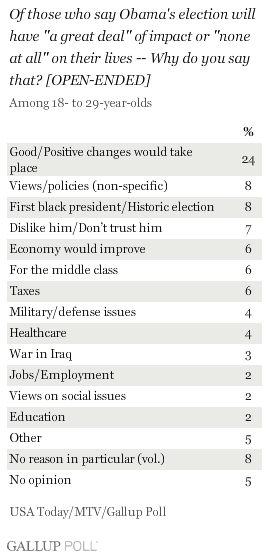
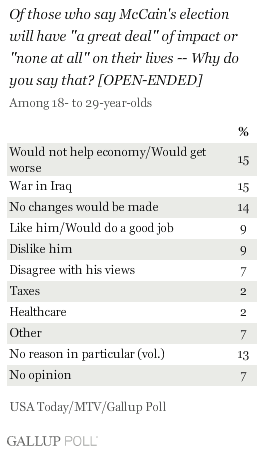
Asked in a separate question how a McCain administration might compare to the Bush administration, 55% said they would view a McCain victory as "four more years of the Bush administration" versus 37% who said they would view it as "real change from the Bush administration."
The two tickets this year also carry the distinction of the first major party black nominee in U.S. history, and only the second major party female vice presidential nominee. In the eyes of young voters, victory for the Obama-Biden ticket would be much more of an historical event than victory for the McCain-Palin ticket. A majority (53%) agree that if Barack Obama is elected president, it would be one of the most important advances in racial equality over the past 100 years. By contrast, only one-third (32%) agree that if Sarah Palin becomes vice president, it will be one of the most important advances in gender equality in the past 100 years.
Bottom Line
A majority of 18- to 29-year-olds are registered to vote in this election and have given it a lot of thought. They prefer Barack Obama, both as an alternative to John McCain, but also as the candidate who is the most likely to understand their problems and to bring positive change to their own lives. Casting a ballot for Obama also carries the excitement of making history. Nearly 8 in 10 consider this election to be more important than other elections, if not the most important in the past 50 years. What remains to be seen is how many of this highly sought-after demographic will in fact turn out and vote on Election Day, and thus help to determine the winner.
Survey Methods
Results are based on telephone interviews conducted September 18-28, 2008, with 903 U.S. adults between the ages of 18 and 29, 633 respondents of whom were randomly selected from a national sample of landline and cellular telephone numbers, and 270 respondents of whom had participated in earlier national Gallup polls and agreed to be re-interviewed for a future poll. For results based on the total sample, which is weighted for demographic information to be representative of 18- to 29-year-olds nationwide, one can say with 95% confidence that the maximum margin of sampling error is ±4 percentage points. For results based on the sample of 742 registered voters, the maximum margin of sampling error is ±5 percentage points.
In addition to sampling error, question wording and practical difficulties in conducting surveys can introduce error or bias into the findings of public opinion polls.
